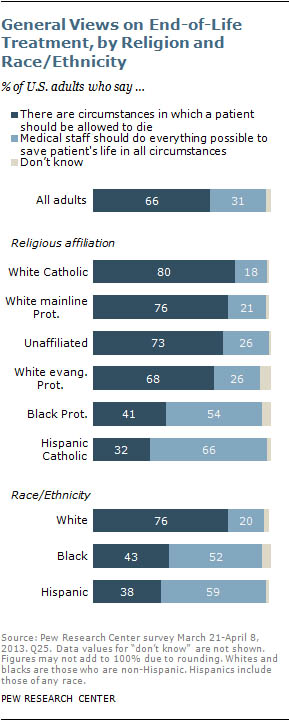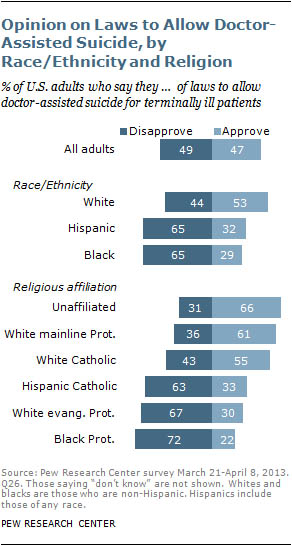Views on End-of-Life Medical Treatments
Pew Research, November 21, 2013
At a time of national debate over health care costs and insurance, a Pew Research Center survey on end-of-life decisions finds most Americans say there are some circumstances in which doctors and nurses should allow a patient to die. At the same time, however, a growing minority says that medical professionals should do everything possible to save a patient’s life in all circumstances.
When asked about end-of-life decisions for other people, two-thirds of Americans (66%) say there are at least some situations in which a patient should be allowed to die, while nearly a third (31%) say that medical professionals always should do everything possible to save a patient’s life. Over the last quarter-century, the balance of opinion has moved modestly away from the majority position on this issue. While still a minority, the share of the public that says doctors and nurses should do everything possible to save a patient’s life has gone up 9 percentage points since 2005 and 16 points since 1990.
{snip}
Religion and End-of-Life Care
Personal preferences about end-of-life treatment are strongly related to religious affiliation as well as race and ethnicity. For example, most white mainline Protestants (72%), white Catholics (65%) and white evangelical Protestants (62%) say they would stop their medical treatment if they had an incurable disease and were suffering a great deal of pain. {snip} By contrast, most black Protestants (61%) and 57% of Hispanic Catholics say they would tell their doctors to do everything possible to save their lives in the same circumstances. On balance, blacks and Hispanics are less likely than whites to say they would halt medical treatment if they faced these kinds of situations.
Religious groups also differ strongly in their beliefs about the morality of suicide. About half of white evangelical Protestants and black Protestants reject the idea that a person has a moral right to suicide in all four circumstances described in the survey. By comparison, the religiously unaffiliated, white mainline Protestants and white Catholics are more likely to say there is a moral right to commit suicide in each of the four situations considered. {snip}
{snip}
The Pew Research survey also asked a question about end-of-life medical decisions for other people. Respondents were asked to choose between two statements: 1) Doctors and nurses should do everything possible to save the life of a patient in all circumstances, or 2) Sometimes there are circumstances in which a patient should be allowed to die. The survey question poses a stark contrast, and both options leave the hypothetical patient’s own wishes unstated. Nevertheless, this forced-choice question provides a useful gauge of overall public attitudes about end-of-life treatment.
{snip}
Public opinion on laws that would allow physician-assisted suicide is closely divided, with 47% approving and 49% disapproving of laws that would allow medical doctors to prescribe lethal doses of drugs for terminally ill patients who choose to commit suicide.
{snip}


















